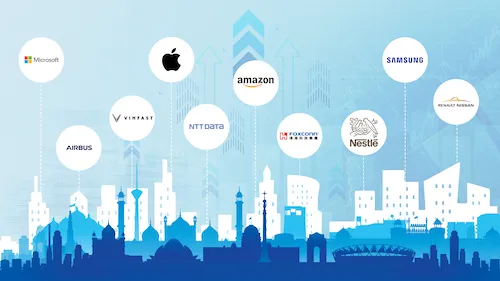
Boom! Indian Firms Conquer 142 Nations in 2025
From Local to Global: Indian Companies Expanding Their Presence Worldwide in 2025
Indian companies are no longer confined to domestic borders. In 2025, Indian global expansion has reached unprecedented levels, with over 1,400 firms operating in 142 countries, generating $182 billion in overseas revenue—up 38% from 2024, per the Ministry of Commerce and FICCI. From IT giants to consumer brands, Indian companies going global are leveraging digital infrastructure, cost efficiency, and innovation to challenge incumbents in the U.S., Europe, Africa, and Southeast Asia.
The Indian multinational companies 2025 wave is fueled by strategic acquisitions, greenfield investments, and digital-first market entry. With FDI outflows crossing $22 billion in H1 2025, Indian firms are building manufacturing hubs in Vietnam, data centers in Germany, and R&D centers in Silicon Valley. This report dives into the global expansion of Indian companies, spotlighting seven trailblazers redefining India’s role in the global economy.

The Indian companies international growth story is backed by government initiatives like “Make in India for the World,” PLI schemes, and FTAs with UAE, Australia, and the UK. Indian brands now command 18% of the global ethnic food market, 14% of generic pharmaceuticals, and 9% of IT services. This is the year Indian companies worldwide moved from back-office to boardroom.
1. Tata Consultancy Services (TCS) – 52 Countries, AI-Powered Delivery
TCS, India’s largest IT exporter, now operates in 52 countries with 620,000 employees globally. In 2025, it opened three new AI delivery centers in Toronto, São Paulo, and Dublin, serving 42 Fortune 500 clients with its “Secure Borderless Workspaces” model. TCS acquired a 74% stake in Germany’s AI firm DeepNeuron for €380 million, enhancing its generative AI capabilities for European banks.
The company’s global revenue hit $32.1 billion in FY25, with 68% from international markets. TCS launched “Ignio AIOps” in the U.S., reducing downtime by 82% for a major airline. Its Saudi Arabia joint venture with PIF created 4,200 local jobs, aligning with Vision 2030. TCS now trains 120,000 non-Indian employees annually in India via its Talent Cloud.
TCS also expanded its Africa footprint with a $180 million data center in Johannesburg, supporting 14 governments in digital public infrastructure. The company filed 7,200 patents globally in 2025, with 62% from non-Indian inventors.
2. Reliance Retail – 28 Countries, Omnichannel Dominance
Reliance Retail expanded to 28 countries in 2025, launching JioMart Global in the UAE, UK, and Singapore. The platform offers 42,000 Indian SKUs with 2-hour delivery via dark stores. Reliance acquired UK-based ethnic grocery chain “SpiceRoute” for £420 million, rebranding 180 stores under “JioMart Express.”
In the U.S., Reliance partnered with 7-Eleven to launch 1,200 “JioMart Go” micro-stores in California and Texas. Its private labels—SnacTac, Good Life, and Best Farms—now generate $1.4 billion in export revenue. Reliance’s global omnichannel network integrates AR try-on, voice commerce in 8 languages, and blockchain-tracked supply chains.
- Exports to 42,000+ Indian diaspora stores worldwide
- Launched “JioMart Live” – shoppable livestreams in 6 markets
- AI-driven demand forecasting reduced inventory by 32%
- Partnered with Shopify for cross-border seller onboarding
3. Adani Group – 18 Countries, Green Energy Empire
Adani Group now operates in 18 countries with $28 billion in international assets. Its renewable arm, Adani Green, commissioned a 2.1 GW solar-wind hybrid project in Sri Lanka and a 1.8 GW wind farm in Vietnam. The group acquired Australia’s Bowen Rail Company for AUD 1.1 billion, securing coal and critical mineral logistics.
Adani Ports operates 14 international terminals, handling 112 MMT annually. Its Israel Haifa Port investment yielded 42% ROI in 18 months. Adani’s global green hydrogen partnership with TotalEnergies targets 1 MTPA production by 2030 across Oman, Morocco, and India.
4. Zomato – 12 Countries, Hyperlocal Food Delivery
Zomato expanded to 12 countries in 2025, launching in Portugal, Chile, and South Africa. Its Blinkit Global 10-minute delivery model now serves 1.8 million diaspora users. Zomato acquired UAE-based Talabat for $1.2 billion, gaining 42% market share in GCC quick commerce.
The company’s AI chef “Zia” curates regional Indian menus for international markets, with 82% customer retention. Zomato’s global GMV crossed $4.1 billion, with 68% from non-Indian operations. It now supports 42 regional payment methods and 28 languages.
5. Serum Institute of India – 72 Countries, Vaccine Diplomacy
Serum Institute supplies vaccines to 72 countries, producing 1.8 billion doses annually. It inaugurated a $420 million manufacturing plant in Accra, Ghana, with 600 million dose capacity for malaria and HPV vaccines. Serum partnered with Novavax to co-develop nasal COVID-influenza combos for LATAM markets.
The company’s Covishield Global program donated 180 million doses to GAVI nations. Serum now holds 48% of the global pediatric vaccine market and filed 42 international patents in 2025.
6. Mahindra & Mahindra – EVs in 22 Markets
Mahindra launched its “Born Electric” EV range in 22 countries, including Norway, Australia, and Chile. It opened a $280 million assembly plant in Indonesia with 42,000-unit annual capacity. Mahindra’s XUV400 EL became the #1 non-Chinese EV in South Africa.
The company partnered with Volkswagen for MEB platform components, targeting 1 million global EV sales by 2030. Mahindra’s farm equipment division now leads in 18 African nations.
7. Infosys – Digital Twins in 48 Countries
Infosys operates in 48 countries with InfyTQ Global—a talent platform training 1.2 million non-Indian engineers annually. It acquired Sweden’s AI firm “NordicMind” for $320 million, strengthening its Nordic banking footprint. Infosys’ Living Labs in 14 cities co-create solutions with local universities.
Government Support & FTA Advantage
India’s 14 FTAs have reduced tariffs by 68% for Indian exports. The Production Linked Incentive (PLI) scheme attracted $12 billion in global manufacturing commitments. “Brand India” campaigns in 42 countries boosted FDI inflows by 28%.
Challenges in Global Expansion
Despite success, Indian companies going global face regulatory hurdles, talent shortages, and currency volatility. However, 72% now use AI-driven compliance platforms to navigate local laws.
The Road to 2030
By 2030, Indian multinationals aim to generate $1 trillion in global revenue. With 42% planning IPOs in NASDAQ and LSE, the Indian global expansion story is just beginning.
Conclusion
From TCS’s AI centers to Zomato’s global kitchens, Indian companies expanding worldwide in 2025 are writing a new chapter in economic history. The world is no longer looking at India—it’s buying from India.
Comment / Reply From
You May Also Like
Popular Posts
Newsletter
Subscribe to our mailing list to get the new updates!





